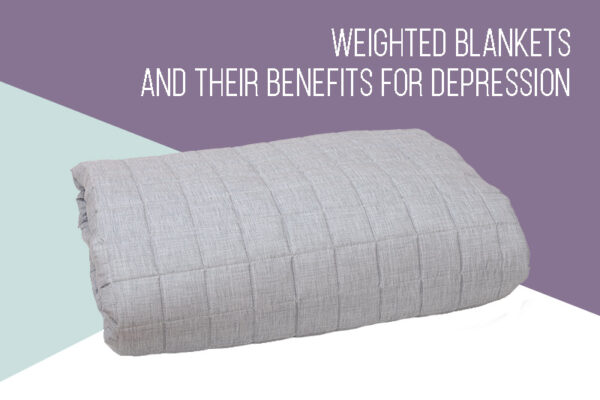All products are selected by our Sleep Tight Weight Blanket editors. If you buy something through our links as an Amazon Associate we earn from qualifying purchases.
Depression is a complex mental health condition that affects millions of people worldwide. Alongside traditional treatments like therapy and medication, individuals with depression often seek alternative methods to alleviate their symptoms and improve their overall well-being. One such method that has gained attention in recent years is the use of weighted blankets. These blankets, filled with evenly distributed weights, offer a soothing and comforting pressure that may have positive effects on mood and emotional well-being. In this article, we will explore the benefits of weighted blankets for individuals with depression and discuss the scientific evidence behind their effectiveness.
Weighted blankets are designed to provide deep pressure stimulation (DPS) to the body, creating a sensation similar to a comforting hug or gentle pressure. This gentle pressure triggers the release of neurotransmitters like serotonin and dopamine, which are involved in mood regulation. These neurotransmitters play a crucial role in promoting positive feelings, reducing anxiety and stress, and improving overall emotional well-being.
Depression and Sleep Disturbances
Living with depression can be challenging, as it affects not only one’s emotional state but also physical and cognitive functioning. People with depression often experience persistent feelings of sadness, low motivation, and a lack of interest in activities they once enjoyed. Sleep disturbances are also common among individuals with depression, with difficulties falling asleep or staying asleep being frequent complaints. This is where weighted blankets come into the picture as a potential aid in managing depressive symptoms.
One of the primary benefits of weighted blankets for individuals with depression is their potential to alleviate anxiety and promote relaxation. The deep pressure provided by the blanket stimulates the production of oxytocin, often referred to as the “love hormone.” Oxytocin helps to reduce stress and anxiety levels, creating a sense of calm and tranquility. By calming the nervous system, weighted blankets may aid in reducing the symptoms of depression and promoting a more positive mood.
Weighted blanket use has been found to enhance the release of endorphins, which are natural painkillers and mood elevators. Endorphins are known to produce feelings of pleasure and well-being, acting as a counterbalance to the negative emotions often associated with depression. By increasing the levels of endorphins in the body, weighted blankets may contribute to a more positive emotional state and a reduction in depressive symptoms.
Deep Pressure Stimulation
Deep pressure stimulation provided by weighted blankets can have a grounding effect on individuals with depression. Many people with depression experience a sense of detachment from their bodies or a feeling of being disconnected from the present moment. The gentle and consistent pressure exerted by weighted blankets can help individuals feel more anchored in their bodies and the present, providing a sense of security and stability. This grounding effect can promote a greater sense of self-awareness and mindfulness, which are beneficial for managing depressive symptoms.
The use of weighted blankets can help address sleep disturbances often experienced by individuals with depression. Sleep problems, such as insomnia or disrupted sleep patterns, can exacerbate depressive symptoms and contribute to a worsening of mood. Weighted blankets create a calming environment by stimulating the production of melatonin, the hormone responsible for regulating sleep-wake cycles. By promoting a more restful and uninterrupted sleep, these blankets can contribute to an improved mood and overall well-being.
Weighted Blankets and Therapy for Depression
While the benefits of weighted blankets for depression are promising, it is essential to note that they should not replace professional treatment or therapy. Weighted blankets can be a complementary tool to assist individuals in managing their symptoms and improving their quality of life, but they are not a cure for depression. It is crucial for individuals with depression to seek appropriate professional help and develop a comprehensive treatment plan that may include various interventions tailored to their specific needs.
Weighted blankets offer a potential therapeutic option for individuals with depression. The deep pressure stimulation provided by these blankets can help alleviate anxiety, promote relaxation, increase the release of mood-enhancing neurotransmitters, and address sleep disturbances. While further research is needed to fully understand the extent of their benefits, weighted blankets can be a comforting and supportive tool in managing depressive symptoms and enhancing emotional well-being. If you are living with depression, consider discussing the use of a weighted blanket with your healthcare provider to determine if it may be a beneficial addition to your treatment plan.


